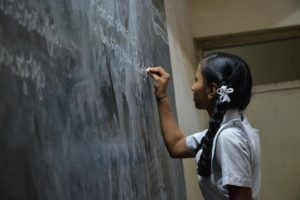Blog
Global Campaigns for Gender Equality in Education: Whose Voices?
Written by Rosie Peppin Vaughan and Orly Siow
July 12, 2018
Malala Day is an occasion to celebrate an inspiring campaigner for gender equality and girls’ education. Of course this issue has gained support in development circles in the last few decades. Moreover it features prominently in the Millennium Development Goals (MDGs), Education for All, and the Sustainable Development Goals (SDGs).
There has been significant progress on gender equality in access and retention under the MDGs. Globally, the percentage of girls out of primary school has fallen from around 20% in 1998 to 10% in 2016. Yet it’s important to remember that just getting girls into school isn’t enough. Serious gender inequalities in education persist through the ongoing marginalisation of certain groups and the conditions girls face within school. They’re also reflected in school-related gender-based violence, and the relationship between education and gender equality in the labour market.
Why is this the case? One reason may be that the MDGs saw a distinct lack of engagement between global policy and women’s organisations on education. This is concerning, since research suggests that collaborating with civil society groups is key to understanding and addressing inequalities. This is a key point for the Sustainable Development Goalss, which explicitly aim to increase engagement with civil society groups.
This also leads us to question whether we can speak of a ‘social movement’ on gender and education that transcends national boundaries. We’ve seen civil society-led activity at the global level in other areas of women’s rights such as health and gender-based violence. While gender and education has been foregrounded in global campaigns, civil society engagement seems to be much lower. Instead it’s UN agencies, bilateral donors and private organisations driving campaigns around gender and education. Why is this? And what are the implications for campaigns for gender equality in education under the SDGs?
Tracing transnational activity
This project investigated these issues by speaking to activists and civil society groups in two countries: India and the UK. Historically both countries have had strong civil society activity on women’s rights. Both also have ongoing engagement with international structures. This is due to the UK’s position as a donor country and India as recipient, and emergent donor. The project identified and interviewed activists and organisations concerned with gender and education. We asked activists about engaging with SDGs and collaborating with other civil society groups on gender and education internationally. Activists also discussed the challenges and barriers faced in engaging with the SDGs and working with groups globally.
We discovered some significant differences in perceptions of the SDGs. Most groups in the UK had limited awareness of the SDGs. In fact, many felt that the SDGs were not relevant because they pertained only to ‘developing’ countries. (The SDGs have an explicit global reach, in contrast to the MDGs). Awareness was higher in India, and many groups were keen for greater engagement. Some groups actually reported that they had contacted the UN with little response. Additionally several interviewees revealed that multilateral agencies see groups working more directly on ‘development’ or ‘human rights’ as ‘natural’ participants. In this way, they are given priority for engaging with the SDGs.
Similar challenges
There were several similarities in the challenges groups faced across both countries. Organisations struggled for resources to engage with events outside of national boundaries whether they relating to global campaigns or informal networking with other civil society groups. UN cuts have also meant that the traditional role in coordinating and supporting civil society engagement across member states is at risk. As a result, there are concerning implications for national organisations.
Across both countries, organisations seeking to address the more complex issues of gender and education also reported difficulties in communications. Their messages struggled to gain cut through alongside the powerful and persuasive ‘get girls into school’ agenda, which dominates current campaigns. This agenda features a simple message about the economic benefits of getting girls into school.
Yet many spoke about opportunities in the future. Interesting questions were raised around the role of digital technology and social media, which some respondents found extremely effective for simple, single-message campaigns (such as gendered toys). Respondents also told us that these technologies enabled low-cost communications with groups campaigning on similar issues in other countries. However, others used digital tech for ‘top-down’ engagement with global initiatives (such as forwarding google alerts about the SDGs). Our interviewees also questioned whether social media and networking could replace deeper discussions and mobilisation work that happened through in-person meetings.
Looking forwards under the SDGs
Overwhelmingly, groups spoke of momentum and feeling a need for change in both contexts. They also demonstrated a willingness and desire for action to move from the national level to the transnational in some form. Some interviewees reported that recent women’s marches suggested broadening interest in mobilising around gender rights and the importance of standing up globally to inequitable practices wherever they emerge. As one activist in India said, “Whether a white man says it or a brown man says it, it doesn’t matter. They are saying the same thing”. Finally, many groups wanted to build more transnational links. They were keen to connect with other groups, and wanted more information on improving their transnational networking. While this desire is heartening, however, it remains to be seen whether the SDGs will provide a more generative setting for transnational collaboration.
Rosie Peppin Vaughan leads the MA in Education, Gender and International Development at the UCL Centre for Education and International Development (CEID). In 2017-2018, she conducted the project, Transnational feminist activism in a multipolar world: global civil society and girls’ and women’s education, with Orly Siow (UCL Political Science). UCL Institute of Education supported the project with seed funding.
Further reading
UNESCO’s E-Atlas of Gender Inequality in Education https://www.tellmaps.com/uis/gender/?lang=en#!/tellmap/-1195952519
World Inequality Database in Education (WIDE)
https://www.education-inequalities.org/
CIVICUS (2018) State of Civil Society Report https://www.civicus.org/index.php/state-of-civil-society-report-2018

